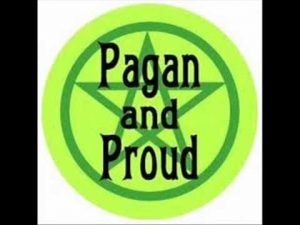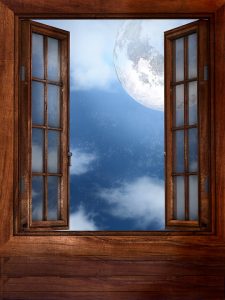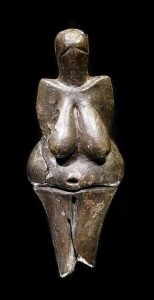My last blog-post, Digitize Me, was a passionate defence of digital communications. It was also a bit of a red herring. I wanted to be on-record as someone who embraces social networking and virtual community before going on-record with a bitter complaint against the same.
It started with an email from a long-time friend. Tracy Cave and I met at a workshop for ASL (American Sign Language) interpreters in … dang, must have been 1979? Anyway, as soon as we were given a break, this bright, blond, impish, elvish guy comes straight over to where I’m sitting and says, “Hi. Are you?”
His question was in reference to the button on my satchel: Pagan and Proud.
“I am,” I replied. “Are you?”
He was, and 37 or whatever the hell years later, the slogan still applies to us both. I early-retired to Wiccan-esque family ritual and then to the life of a solitary witch, but Tracy has kept his toes in the more public Pagan pools over the years. So when he up and tells me modern Pagans don’t read, I have to believe him.
The idea of studying (reading books–not just websites) for a year and a day seems preposterous to them, he says. It’s a shocking concept for me. Back in the day – back when finding a fellow Pagan in the real world was as rare and wonderful as finding a four-leaf clover – it was books that awakened us, books that guided us, books that brought us together.
For many, it was Margot Adler’s Drawing Down the Moon that struck the spiritual spark. For some, it was Robert Graves’ The White Goddess. For others, Hans Holzer’s The Neo-Pagans, or Farrar’s What Witches Do, or Blavatsky’s The Secret Doctrine.
For me it was the folktales and folksongs, so rich in old lore. For me, it was the myths. Late in my college life I lucked into a tiny seminar on Old Welsh. The text for the course was Llyfr Coch Hergest (The Red Book of Hergest), plus assorted bits from other essential works of Cyrmu mythology.
“By the gods my people swear by!” Pwyll and Branwen and Llew Llaw Gyffes kept exclaiming, until it dawned on me that self-righteous Christian monks had censored the stories, cutting out the true Names of the ancient Gods, so we could never invoke them again.
Hell with that. I made it my business to pry forgotten Names from between the lines of obscure Hogmany chants, find the places of power on ancient maps, sing the old songs, dance the old dances, and read the old tales. I read them – we all read – voraciously.
So, modern pagans don’t read much anymore. A good portion of what they do read, according my quick google-scan of pagan literature, are critiques and negative reviews of the volumes that inspired their elders. Mostly, though, they read web pages full of distilled witch-y info, some of it good stuff, some of it garbage.
Which brings me to the real sticking point. This from Tracy’s email:
The other interesting thing … is that the millennial Pagans aren’t interested in meeting with like-minded folks. By and large, they’re an on-line Pagan presence and wouldn’t cross the street to check out a real coven… with the access to Pagan/Wiccan information increasing, the desire to join a coven or read anything longer than a webpage has decreased…
It’s a perfect paradox. Paganism – nature-based religion – is almost extinct on planet Earth, but has a full-blown virtual existence in cyberspace. In his thorough, thoughtful article (written in 1995 – jeez, I’m that far out of the Pagan loop?), “Imagining a Virtual Religious Community: Neo-Pagans and the Internet,” Gregory Price Grieve notes that the lack of face-to-face oral communication generally considered to be essential to the formation of authentic communities hasn’t impeded the Neo-Pagan cyber-community in the least.
This is painfully disturbing. For me, the whole point of Paganism is to be in touch with the natural, physical universe. When I ran out of original sources to read, when my Old Religions research petered out or hit a dead end, what consoled me was the realization that censors and highways and New Religions couldn’t destroy old knowledge. Not forever. The lessons our ancestors learned from the sun, moon, and stars, from the tides and the winds, from the plants and animals, from the seasons, from the mysteries of life and love and death, from the dreams our Mother sends us – these lessons are always ours to learn again. Because the same sun travels the same journey ever she did. The same moon waxes and wanes. The world spins on, and all we have to do to discover the old magic is open our senses wide.
My passion is the calendar. I have no patience for those who celebrate Samhain on Halloween. Sure, Halloween is the modern equivalent of the Celtic New Year, but we can bloody calculate the exact cross-quarter, so why not celebrate on the day? I am contemptuous of those who celebrate the Full Alder Moon on the “Alder Moon” date Robert Graves stuck in his book. Look out the damn window – see if the moon is actually full before dancing the ring.
If I get bent out of shape by people who are getting together and partying in Pagan fashion, how am I supposed to feel about Pagans who don’t bother getting together at all?
COG (Covenant of the Goddess) holds an annual Merry Meet. As he has many a time before, Tracy attended this year. When someone did a poll of folks in the meeting room, he reports, the youngest person there was 45, several people had canes and walkers, and the back of the room was filled with carts the elderly Pagan attendees needed to get around.
I can’t believe I was so naïve. I noticed the proliferation of Pagan websites – of course I did. I rejoiced to see my belief system blatantly out in the open. I rejoiced to see Paganism getting occasional recognition as a bona fide religion. I thought all the websites meant more bodies in the Circles. I had no idea my chosen spiritual path had arrived at a cyber-destination.
Using the term “presence” to describe the evidently archaic tradition of personal interaction, Grieve says,
“What is unique about neo-Pagan practitioners is that they are able to imagine a religious community which is not dependent on presence. Instead … their Internet communities are sustained by the notion of a religious ‘energy’ which is created and circulated by ‘personal rituals.’ It is their shared ‘feeling of energy’ which binds them together in cyberspace, and enables them to imagine a virtual religious community. Neo-Pagans ‘re-enchant’ the disenchanted landscape of modernity through a religious strategy whose myths are patterned on an imagined pre-Christian European religion, but whose practices revolve around the production of an affective sentiment which neo-Pagan nomenclature labels ‘energy.’ The ‘feeling of energy’ created by personal rituals is a religious strategy which employs a ritualized imagination. The ritualized imagination is the sanctification not of the content of specific creative acts, but of the act of creation itself. Hence, the religious strategies that surround neo- Paganism concentrate neither on written unifying myths, nor on a set of oral traditions, nor even on a ritual complex. Instead, what binds neo-Pagans together on the Internet, and how they overcome its lack of presence, is through the experience of the perceived sentiment that accompanies creativity itself.”
What hurts the most is the callous de-bunking of my generation’s life-long research. We found real spells, dammit. We found recipes for powerful potions. We found Rom who taught us how to read the cards. We found Native Americans who taught us a rhythm to drum the campfire smoke away from our eyes. We found the Names of the Gods our people swear by.
All “patterned on an imagined” religion, apparently. All fantasy. I thought we Pagans were, in a small way, doing something toward healing the spiritual sickness of humanity. I thought by lighting the fire, drinking from the cup, calling the quarters, and drawing down the moon skyclad and adorned in sacred knots – I thought we were keeping it real.





There IS something not quite right about it, something abuot the richness of what we share, not just with words or sounds, but with body language, as well. And how do you pass the chalice from one hand to another on the Internet?
Yes, exactly. But I can’t feel totally right about have such a bad attitude towards the online Pagan community, either. (“Yikes, the millennials are at the moat of my castle with torches and pitchforks!” Tracy emailed me after reading this post.) When Neil was first getting seriously into gaming, it sure looked like a horrible choice on a social level. I mean, the kid’s just sitting there in front of a screen instead of being out in the world hanging with friends, right? Then I realized he was hanging not only with his local buds online, but with friends in a virtual community that spanned the globe. Playing games with folks Down Under gave him real folks to visit in Melbourne — which he did. I can see the whole V-Community thing as a viable social landscape. I just can’t see it being viable for a nature-based, feasting, dancing, singing, music-making, love-making religion.
Hi again Risa – sorry, darn Spellcheck mangled your name….
Hi Russ – did I ever ask you if you know Stephen Stirling’s series of novels about “the Change” a future in which the Old Religions are revived in parts of America?
Hi Muchael… nah, doesn’t work. Spellcheck can handle a name like yours. I’m digressing here, just found a website “How Many of Me – Census Search Results.” There are 4,273,478 people in the US with the first name “Michael” (why spellcheck can handle it) and 3,099 with the full name “Michael Reynolds”. Surprisingly, there are 3,236 people in the US named “Risa” (way more than I expected!), but, of course, only 1 “Risa Aratyr.”
Back to blog — no, don’t think you have asked me about that series, which I have not read. My internet’s being wonky at the moment, won’t give me a search engine to check it out. Worth adding to the reading list?
Nice post. And sadly this is not unique to the pagan community. This represents a disconnect from the world in general. There are plenty of articles out there on the tipping point of human evolution (check out http://discovermagazine.com/1987/may/02-the-worst-mistake-in-the-history-of-the-human-race for example) which would suggest we are starting to go backwards after thousands of years of progress. Here’s a quote from the piece to give you a clue: “today just three high-carbohydrate plants – wheat, rice, and corn – provide the bulk of the calories consumed by the human species, yet each one is deficient in certain vitamins or amino acids essential to life.”). If indeed it was beauty that killed the beast, it will be arrogance that does for the human race. Never mind that most folks don’t understand what the cross-quarter is; most of them don’t know what spaghetti is made from. I don’t know if the internet is solely to blame. In fact, I’m sure it isn’t. But there will always be a quorum of kool-aid drinkers out there.
P.S. That Grieve chap sounds like a right dick…
Wonderful, if somewhat depressing, article, Dec. Thanks for the link. I’m full ready to admit I’m being unreasonable about the calendar business. Weighing the options — getting together and practicing magical arts on an “off” day or virtually raising “energy” from a chant snagged off the net — I far prefer the option with personal interaction.